|
|
|
Sort Order |
|
|
|
Items / Page
|
|
|
|
|
|
|
| Srl | Item |
| 1 |
ID:
087293
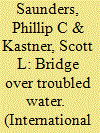

|
|
|
|
|
| Publication |
2009.
|
| Summary/Abstract |
In Taiwan's 2008 presidential election, both candidates advocated signing a peace agreement with China, and Chinese leaders have also expressed interest in reaching such an agreement. Although substantial obstacles remain in the way of a cross-strait peace agreement, this increased interest on both sides of the Taiwan Strait suggests that a closer examination of an agreement's possible dimensions and consequences is warranted. This analysis considers what an agreement might look like, whether and how it might be effective in reducing the possibility of cross-strait military conflict, the relevant barriers to an agreement, and whether an agreement-if reached-would be likely to endure.
|
|
|
|
|
|
|
|
|
|
|
|
|
|
|
|
| 2 |
ID:
134993
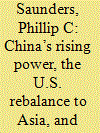

|
|
|
|
|
| Summary/Abstract |
The Obama administration’s “rebalance to Asia” has many elements of continuity with past policy, including recognition that rapid growth and economic dynamism have greatly expanded the Asia-Pacific region’s economic and strategic weight and importance to U.S. interests. Administration officials emphasize that the rebalance involves a comprehensive diplomatic, economic, and military approach that pays more attention to India, Southeast Asia, and regional institutions; that the timing was dictated largely by the need for clear priorities to guide force development in an era of declining spending; and that demand by U.S. allies and partners for an increased U.S. commitment to the region played an important role in shaping the rebalance. U.S. diplomatic, economic, and military efforts to implement the rebalance demonstrate a significant increase in strategic attention to the Asia-Pacific region, matched by commitments of diplomatic, economic, and military resources, including the time of senior U.S. leaders. Chinese officials and scholars have reacted by expressing concern and skepticism about the stated U.S. rationale, lamenting the “lack of strategic trust” between Washington and Beijing, urging greater respect for Chinese “core interests,” and stressing negative consequences of the rebalance for Asian security (especially its supposed role in emboldening U.S. allies and partners to challenge Chinese maritime territorial claims). At the same time, they have redoubled efforts to stabilize Sino-U.S. relations and to build a “new type of great power relations.” A key implementation challenge is making the rebalance robust enough to reassure U.S. allies and partners of the U.S. capability and will to maintain its presence in Asia over the long-term, while not alarming Chinese leaders to the point where they forego cooperation with Washington. U.S. and Chinese leaders should work to expand and deepen the scope of bilateral cooperation on common interests, while seeking ways to limit and manage competitive aspects of U.S.-China relations.
|
|
|
|
|
|
|
|
|
|
|
|
|
|
|
|
| 3 |
ID:
074896
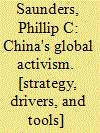

|
|
|
|
|
| Publication |
Washington, DC, National Defense University Press, 2006.
|
| Description |
viii, 59p.
|
|
|
|
|
|
|
|
|
|
|
|
Copies: C:1/I:0,R:0,Q:0
Circulation
| Accession# | Call# | Current Location | Status | Policy | Location |
| 051780 | 338.90951/SAU 051780 | Main | On Shelf | General | |
|
|
|
|
| 4 |
ID:
111747
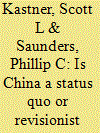

|
|
|
|
|
| Publication |
2012.
|
| Summary/Abstract |
China's rising power and increased global activism have attracted increasing attention, with particular focus on whether a stronger China is likely to be a revisionist or status quo state. Power transition theory highlights the potential for a dissatisfied rising power to challenge the existing international order, but it is difficult to evaluate whether a rising power is dissatisfied. Where Chinese leaders choose to travel can offer insights into whether China's behavior is more consistent with that of a revisionist or status quo state and into China's broader diplomatic priorities. We present a series of expectations concerning how the travel patterns of a challenger state are likely to differ from the travel patterns of a status quo state. Using a newly compiled data set, we then analyze the correlates of travel abroad by top Chinese leaders from 1998 to 2008. Our results are more consistent with a status quo conceptualization of China, though there are some important exceptions such as willingness to travel to rogue states. We also use travel data to test other hypotheses about Chinese foreign policy behavior.
|
|
|
|
|
|
|
|
|
|
|
|
|
|
|
|
| 5 |
ID:
068513
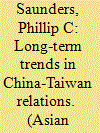

|
|
|
| 6 |
ID:
055962
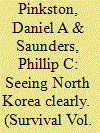

|
|
|
|
|
| Publication |
2003.
|
| Description |
p79-101
|
|
|
|
|
|
|
|
|
|
|
|
|
|
|
|
| 7 |
ID:
077365
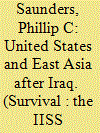

|
|
|
| 8 |
ID:
148215
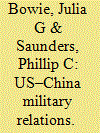

|
|
|
|
|
| Summary/Abstract |
China’s efforts to build a ‘new type of great power relations’ and a ‘new type of military-to-military relations’ do not constitute a major turning point in relations with the United States. Political relations set limits on military cooperation, and the two sides have been unable to construct a sustainable strategic basis for relations. This has contributed to an ‘on-again, off-again’ pattern in military ties. Trends show a pattern of frequent disruptions in military-to-military relations from 2000 to 2010, followed by an increase in interactions beginning in 2012. Nevertheless, obstacles on both sides are likely to limit mutual trust and constrain future development of military-to-military relations.
|
|
|
|
|
|
|
|
|
|
|
|
|
|
|
|
|
|
|
|
|